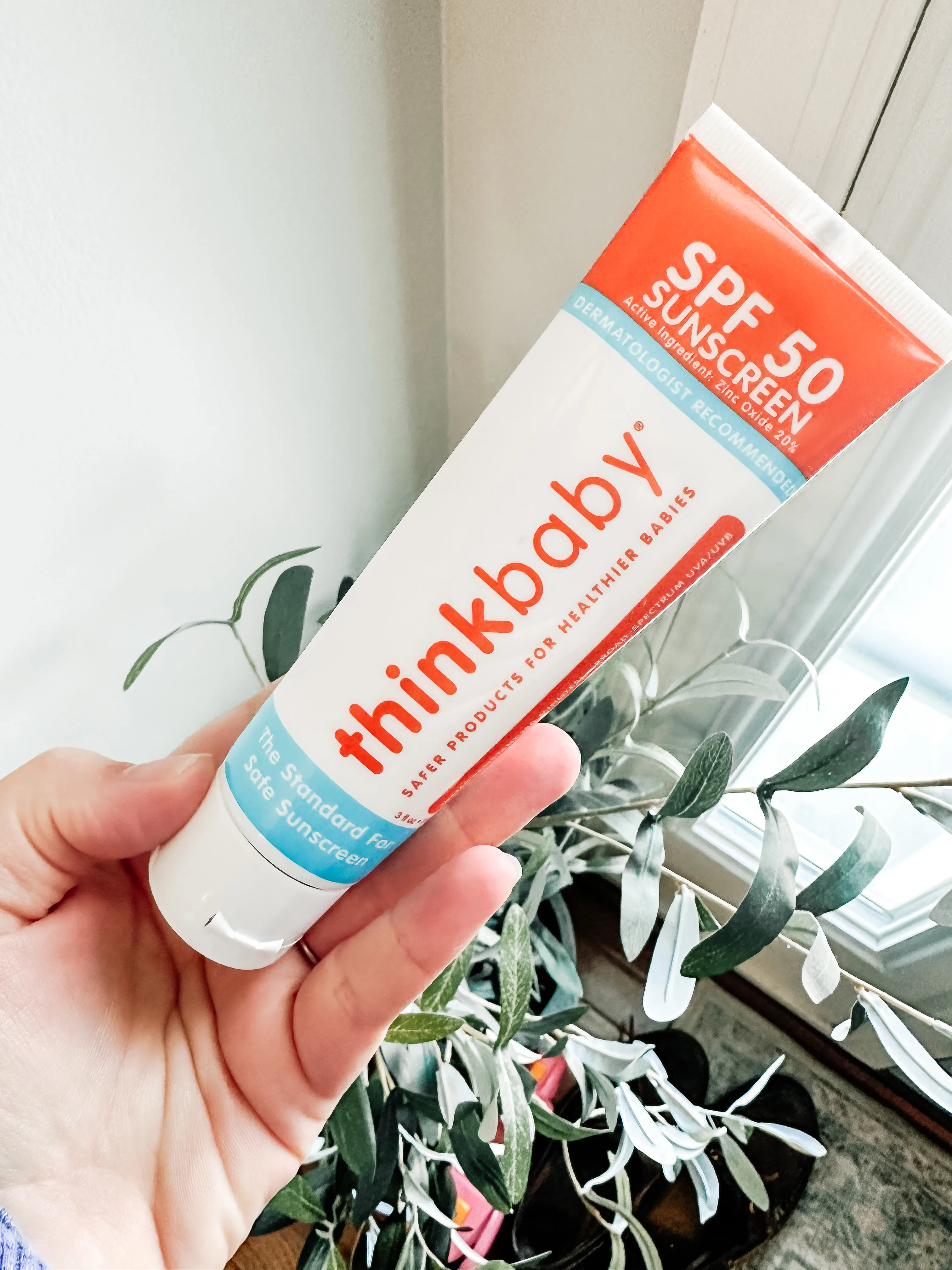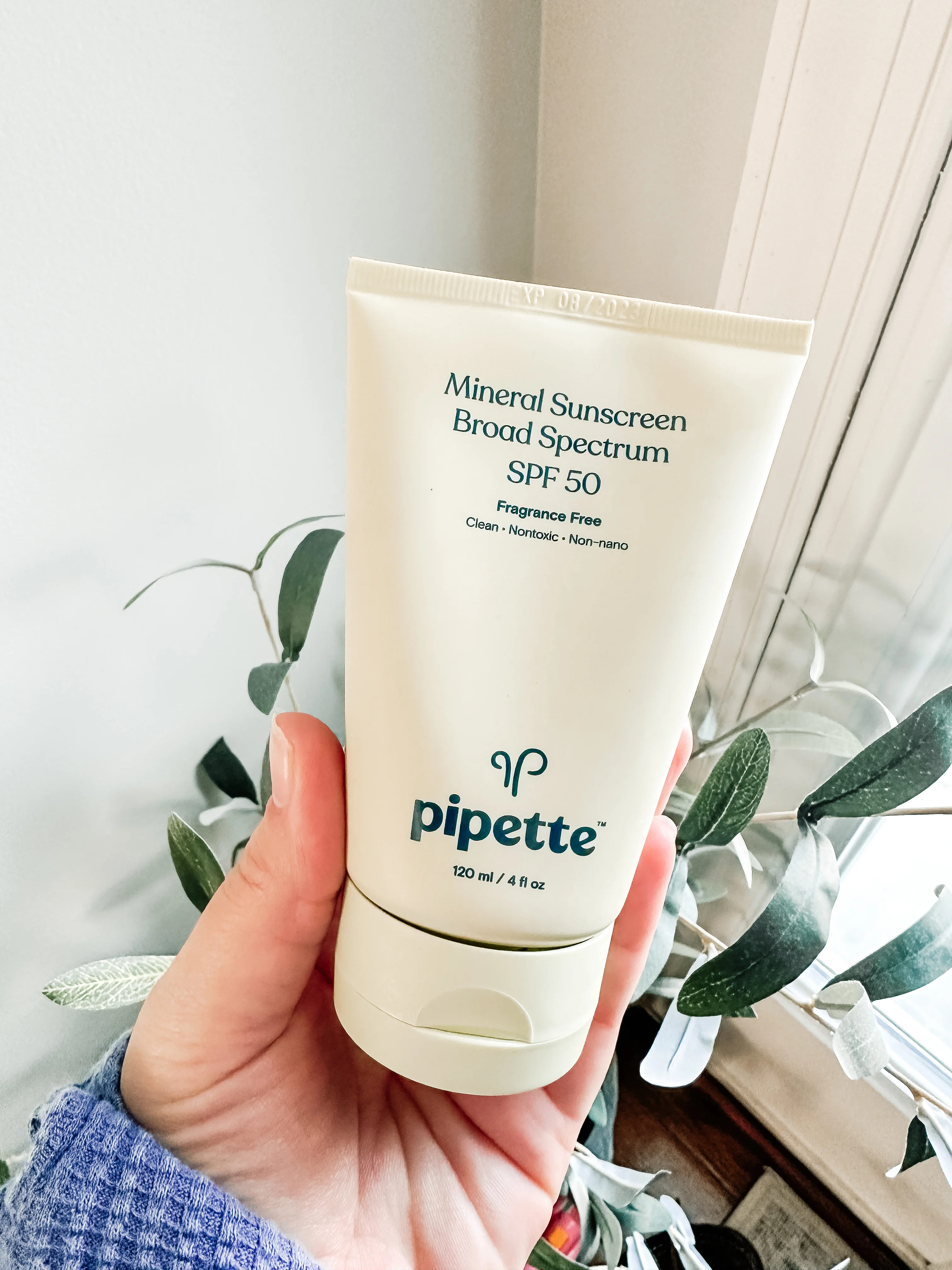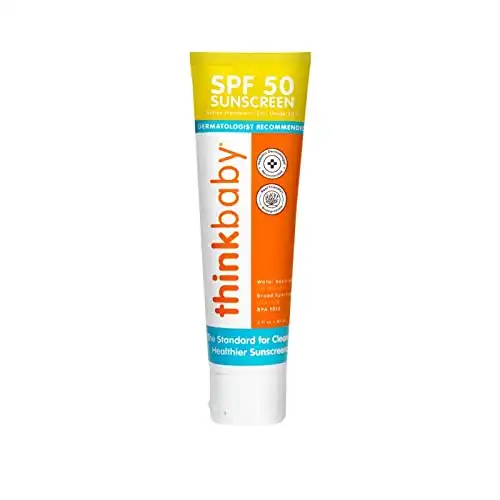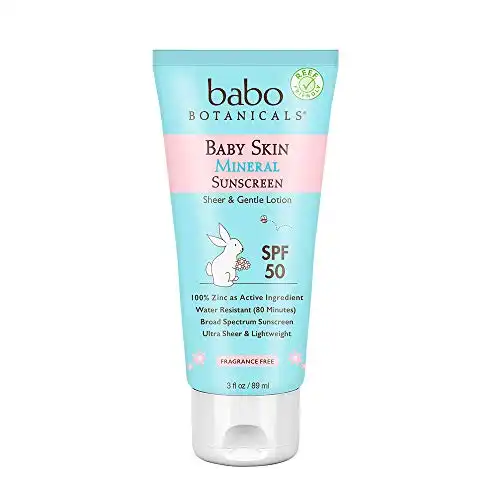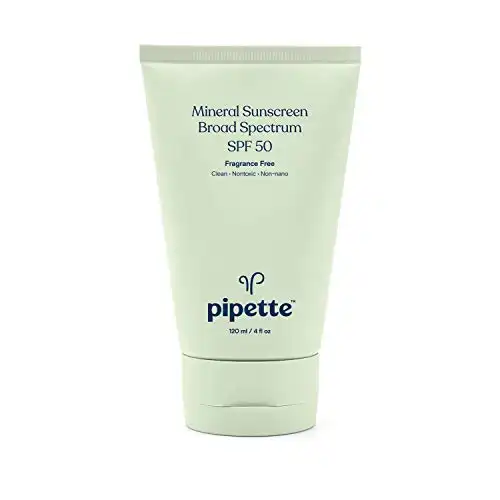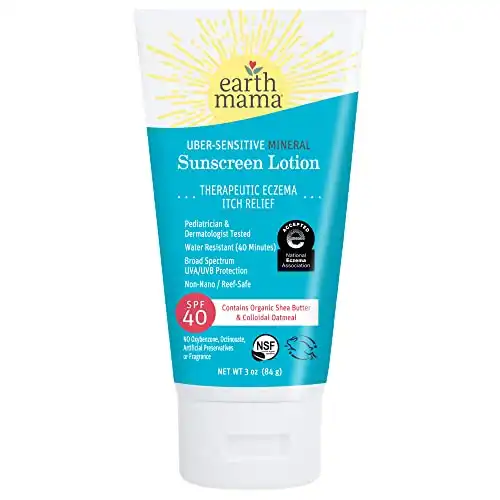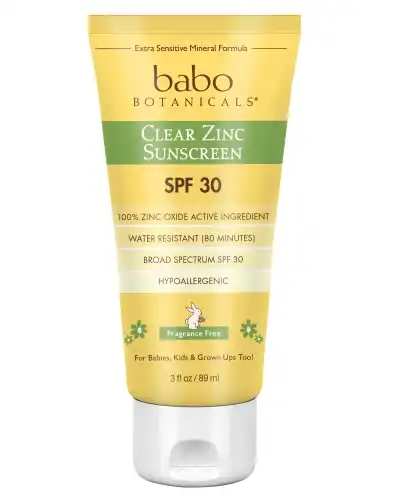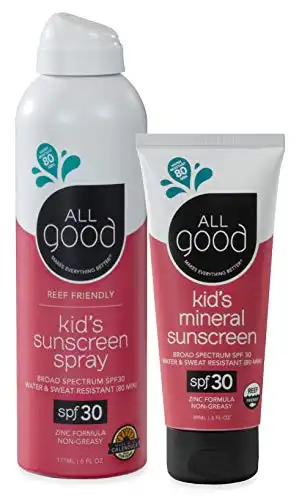As a mom of two young boys, I have tried out many sunscreens over the years. Here are my top picks for the best non toxic baby sunscreen. Click here to skip to the list.
This post may contain affiliate links.
Each has it’s pros and cons but my very top pick is the Think Baby SPF 50+ Baby Sunscreen. It uses non-nano zinc oxide, is easy to rub in, has a generous product amount in the tube, is water resistant for up to 80 minutes, and offers SPF 50 protection.
My second favorite is the Pipette Sunscreen, especially for the face. It is not water resistant but rubs in much easier and leaves less of white cast.
Everyone knows that sunscreen is essential when it comes to protecting our skin from the sun’s harmful UV rays.
This is even more true for babies because they have very delicate skin. However, you can’t just use any sunscreen on your little one’s skin.
Not all sunscreens are created equal. Some contain chemicals that can irritate your baby’s skin, disrupt hormones, or even trigger allergic reactions.
Therefore, it is very important to ensure that you only use a non-toxic sunscreen that is safe and effective for your little one’s sensitive skin.
Non-toxic sunscreens are great for babies because they are free of parabens, phthalates, fragrances, and other potentially harmful additives, toxic chemicals, and endocrine disruptors.
In this article, we will review 7 of the best non-toxic baby sunscreens on the market this year. Hopefully, this will help you find the perfect sunscreen for your baby’s needs.
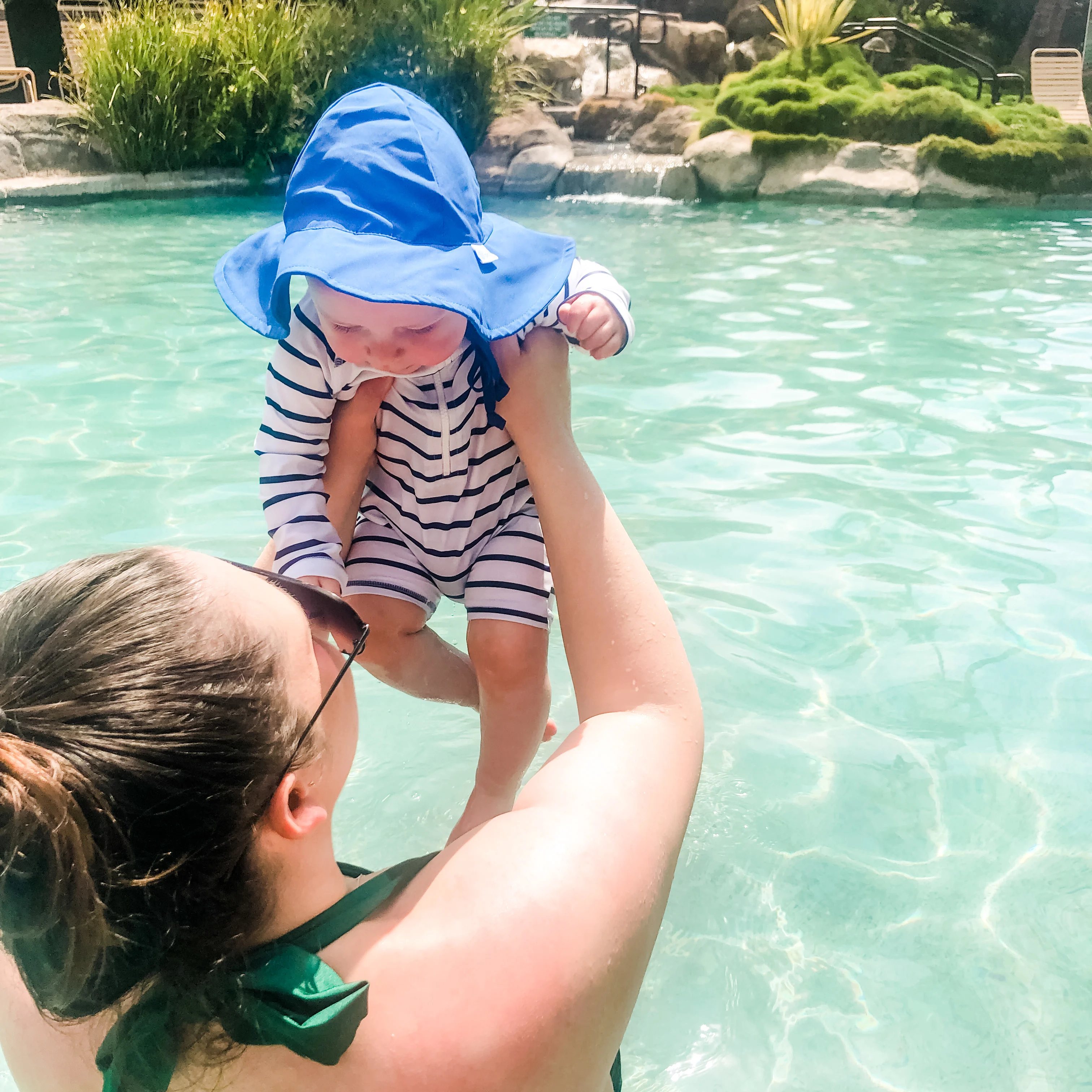
Why does nontoxic baby sunscreen matter?
It is easy to think that any sunscreen is better than no sunscreen when it comes to protecting your baby from the sun. But did you know that some sunscreens can actually do more harm than good?
A lot of sunscreens contain dangerous chemical ingredients that have been shown to lead to health issues like hormone disruption, allergies, or even ironically, cancer.
These chemicals can be absorbed into your baby’s bloodstream and affect their development and well-being. What’s more, some of these chemicals can even pollute the environment and harm marine life!
That’s why nontoxic sunscreen matters. Non-toxic sunscreens are made with mineral ingredients that form a physical barrier on the skin to block both UVB and UVA rays.
They are not absorbed into the body or the environment as much as chemical sunscreens. For babies, they are also less likely to cause irritation or allergic reactions on your baby’s sensitive skin.
That said, it is important to point out that even non-toxic sunscreens are not recommended for babies under 6 months of age. That’s because their skin is still too thin and fragile to handle any kind of sunscreen.
The best way to protect your infant from the sun is to keep them in the shade and out of direct sunlight, dress them in protective clothing and hats, and avoid exposure during peak hours.
Overview of My Top Picks
What Ingredients To Avoid In Baby Sunscreen
When choosing sunscreen for your baby, you want to make sure it is safe and effective.
This means you have to be careful about the kind of ingredients that the conventional sunscreen has been made with. Always check the ingredient lists for these.
Here are some of the ingredients you should avoid:
- Oxybenzone: This is a chemical filter that absorbs UV rays and prevents sunburn. However, it can also penetrate the skin and enter the bloodstream, where it can act like estrogen and interfere with normal hormone function. It can also cause allergic reactions in people with sensitive skin (especially babies!).
- Avobenzone: This is another chemical filter that protects against UVA rays. However, it can degrade quickly when exposed to sunlight and lose its effectiveness. It can also react with other ingredients and form free radicals that can harm skin cells.
- Octinoxate: This is yet another chemical filter that protects against UVB rays. However, it can also penetrate the skin and disrupt hormone balance. It can also cause allergic reactions.
- Homosalate: This is a common ingredient in sunscreens that can penetrate the skin and accumulate in the body over time. It can also disrupt hormone function and enhance the absorption of other chemicals into the skin.
- Octocrylene: Also used in the composition of some chemical filters, it can penetrate the delicate skin of babies and cause allergic reactions. It can also generate free radicals that can damage the skin cells.
- Retinyl palmitate: This is a form of vitamin A that is added to some sunscreens as an antioxidant. However, it can also react with sunlight and form free radicals that can speed up aging and increase the risk of skin cancer.
The best way to avoid these harmful ingredients is to choose a mineral sunscreen that uses non-nano zinc oxide as the active ingredient.
Titanium dioxide is also an option, thought the environmental working group (EWG) offers insight on why this ingredient shouldn’t be used.
These are natural minerals that reflect UV rays instead of absorbing them. They are safe for babies’ sensitive skin and do not harm the environment.
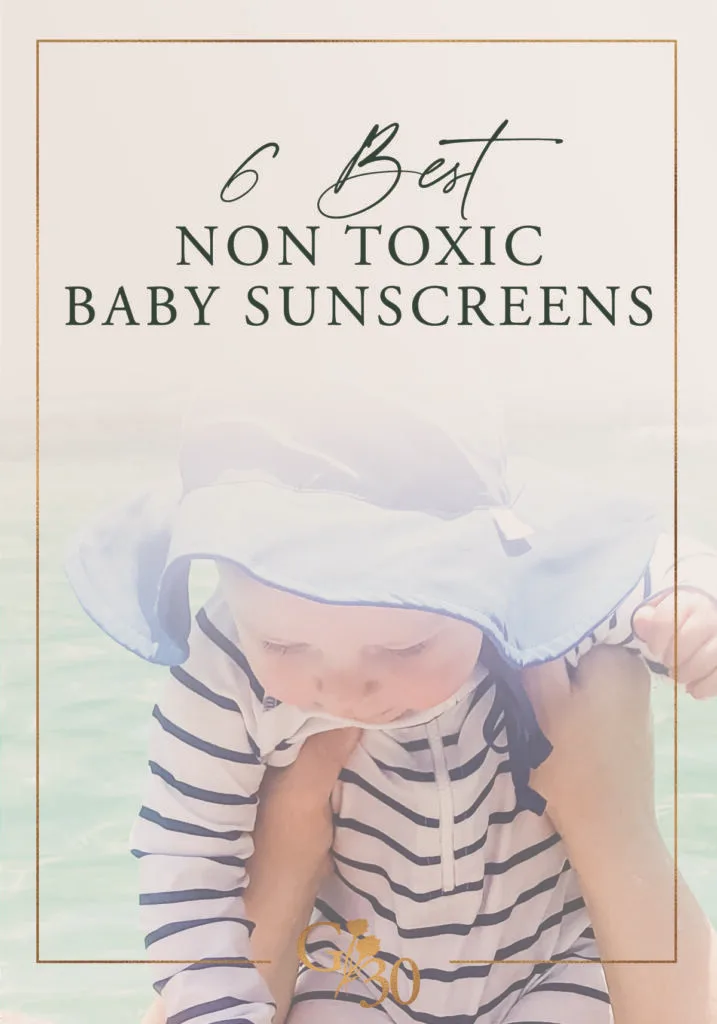
Chemical vs Physical Sunscreen
Sunscreen can be classified into two types: chemical and physical.
The difference between the two is pretty straightforward:
- Chemical sunscreen contains synthetic compounds that absorb UV rays and convert them into heat.
- Physical sunscreen contains natural minerals that reflect UV rays and block them from reaching the skin.
Both types of sunscreen can offer protection against sunburn and skin damage. However, they have different advantages and disadvantages.
Here are some of them:
- Chemical sunscreen is thinner and easier to apply than physical sunscreen. It also does not leave a white cast on the skin. However, it can penetrate the skin and enter the bloodstream, where it can disrupt hormone function and cause allergic reactions. It can also degrade quickly when exposed to sunlight and lose its effectiveness.
- Physical sunscreen is safer and more stable than chemical sunscreen. It does not penetrate the skin or enter the bloodstream, so it does not interfere with hormone function or cause allergic reactions. However, it can be thicker and harder to apply than chemical sunscreen. It can also leave a white cast on the skin if not rubbed in well.
For babies, physical sunscreen is generally recommended over chemical sunscreen because it is gentler on their sensitive skin and does not pose any health risks.
However, you should always check the label for any common ingredients that may cause irritation or allergies.
Nano vs Non-Nano Particles in Sunscreen
Yet another important thing to consider when choosing your little one’s sunscreen is whether it contains nano or non-nano particles.
Nanoparticles are very small particles that measure less than 100 nanometers (nm) in size. On the other hand, non-nano particles are larger and measure more than 100 nm in size.
The size of the particles affects how they behave on the skin and in the environment.
Here are some of the differences between nanoparticles and non-nano particles:
- Nanoparticles are more transparent on the skin than non-nano particles. This is because they scatter less light. They also spread more easily on the skin because of their size. However, they may penetrate deeper into the skin layers and potentially cause inflammation or damage. They may also enter the bloodstream or other organs through inhalation or ingestion. Some compounds have also been shown to be harmful to coral reefs (coral bleaching) and aquatic life which harms the marine environment.
- Non-nano particles are more visible on the skin than nanoparticles. They scatter more light because of their large size. They also provide better protection against UV rays since they cover more surface area on the skin. Plus, because they are so large, they do not penetrate deep into the skin layers or enter other organs through inhalation or ingestion. They are also not harmful to coral reefs or aquatic life.
For babies, non-nano particles are generally preferred over nanoparticles. This is because they are safe for your little one’s delicate skin and do not pose any health risks.
6 Best Non-Toxic Baby Sunscreens
Despite all of this, the good news is that there are better non toxic options available.
Let’s now take a look at our selection of some of the best non-toxic baby sunscreens:
Think Baby Safe Sunscreen SPF 50 – TOP PICK
Perfect for babies, it is made using non-nano zinc oxide and organic ingredients like sunflower oil, cranberry seed oil, and jojoba oil.
Think Baby is a natural sunscreen that provides effective SPF 50+ protection.
Perfect for babies, it is made using zinc oxide and organic ingredients like sunflower oil, cranberry seed oil, and jojoba oil.
It is water resistant for up to 80 minutes and has a delightful light orange scent. You’ll also love that it is vegan, cruelty-free, and reef-friendly.
Pros:
- Broad spectrum UVA/UVB protection
- Gentle on sensitive skin
- Non-nano zinc oxide formula
- Smells nice
- Natural ingredients
Cons:
- May leave a white cast on darker skin tones
- May stain clothing if not rubbed in well
Babo Botanicals Baby Skin Mineral Sunscreen SPF 50
It is made with zinc oxide and organic ingredients like shea butter, jojoba oil, and chamomile. It is also water resistant for up to 80 minutes.
Babo Botanicals is a mineral sunscreen that is rated at SPF 50.
It is made with zinc oxide and organic ingredients like shea butter, jojoba oil, and chamomile. It is also water resistant for up to 80 minutes.
Babo Botanicals comes in a fragrance-free formula. It is also vegan, cruelty-free, and reef-friendly.
Babo Botanicals is also a certified B Corporation and meets the highest standards of social and environmental impact.
Pros:
- Non-greasy and non-whitening
- Moisturizing and soothing
- Certified by NSF Organic and Made Safe
Cons:
- May be too thick for some preferences
- You may have to reapply frequently for optimal protection
Pipette Mineral Sunscreen Broad Spectrum SPF 50
It is made with non-nano zinc oxide and plant-derived ingredients like squalane, glycerin, and sunflower seed oil. It has a lightweight formula that is also hypoallergenic, dermatologist-tested, and reef-safe.
Pipette is a mineral sunscreen that is designed to provide broad-spectrum SPF 50 protection for babies.
It is made with non-nano zinc oxide and plant-derived ingredients like squalane, glycerin, and sunflower seed oil. It has a lightweight formula that is also hypoallergenic, dermatologist-tested, and reef-safe.
Pros:
- Easy to apply and use
- Hydrating and gentle
- Free of fragrance, parabens, phthalates, and sulfates
Cons:
- May leave a slight white cast on some skin tones
- May be too runny for some preferences
Earth Mama Uber Sensitive Mineral Sunscreen Lotion SPF 40
It is made with non-nano zinc oxide and organic ingredients such as colloidal oatmeal, shea butter and olive oil. It is water resistant for up to 40 minutes.
Earth Mama is a mineral sunscreen that provides SPF 40 protection.
It is made with non-nano zinc oxide and organic ingredients such as colloidal oatmeal, shea butter and olive oil. It is water resistant for up to 40 minutes.
You’ll love that it comes in a steroid-free formula that is vegan, cruelty-free, and reef-safe.
Pros:
- Great for eczema-prone skin and young babies
- Nourishing and calming
- EWG-verified and NSF certified
Cons:
- SPF 40 protection is a little lower than other options on this list
- You have to shake it well before use
- You don’t get much for your money
Babo Botanicals Clear Zinc Sunscreen Lotion SPF 30
Made with zinc oxide and organic ingredients like sunflower oil, jojoba oil, and green tea extract. It is water resistant for up to 80 minutes and comes in a nice summer scent.
Babo Botanicals Clear Zinc is a mineral sunscreen that offers SPF 30 protection for babies.
It is made with zinc oxide and organic ingredients like sunflower oil, jojoba oil, and green tea extract. It is water resistant for up to 80 minutes and comes in a nice summer scent. It is also vegan, cruelty-free, and reef-safe.
Pros:
- Non-nano and non-whitening
- Hydrating and antioxidant-rich
- Free of soy, dairy, gluten, and fragrance
Cons:
- May be too sticky for some preferences
- May have a strong smell for some noses
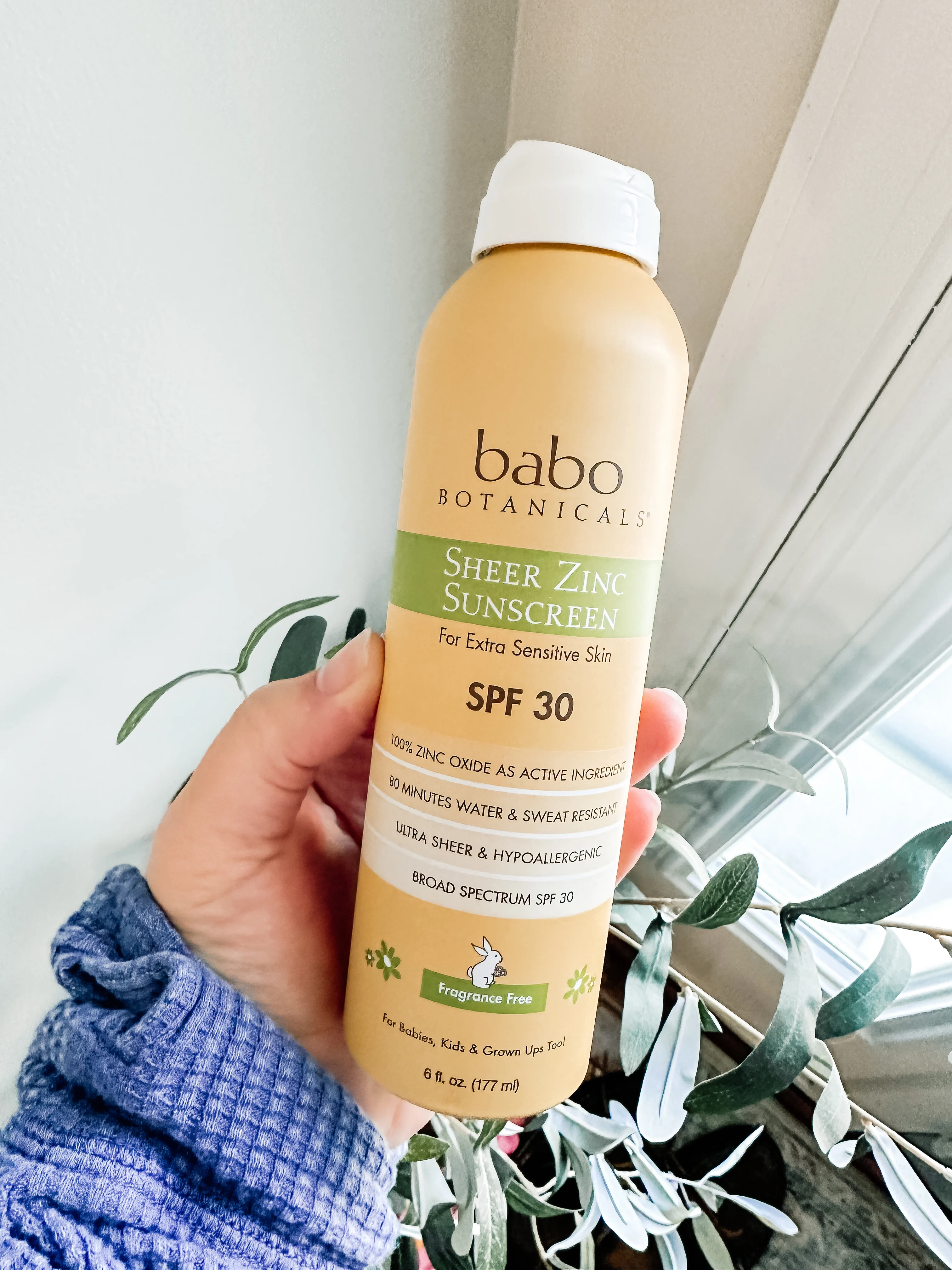
All Good Baby and Kids Mineral Sunscreen Lotion SPF 30
It is made with zinc oxide and organic ingredients like coconut oil, calendula extract, and chamomile extract. It comes in a nice lightweight formula that is easy to apply for babies.
All Good Baby and Kids is a mineral sunscreen that provides broad-spectrum SPF 30 protection for babies.
It is made with zinc oxide and organic ingredients like coconut oil, calendula extract, and chamomile extract. It comes in a nice lightweight formula that is easy to apply for babies.
Pros:
- Easy to spread and absorb
- Soothing and calming
- Biodegradable and GMO-free
Cons:
- May need to reapply often for optimal protection
- May not be suitable for very sensitive skin
- Takes longer to rub in than other options on this list
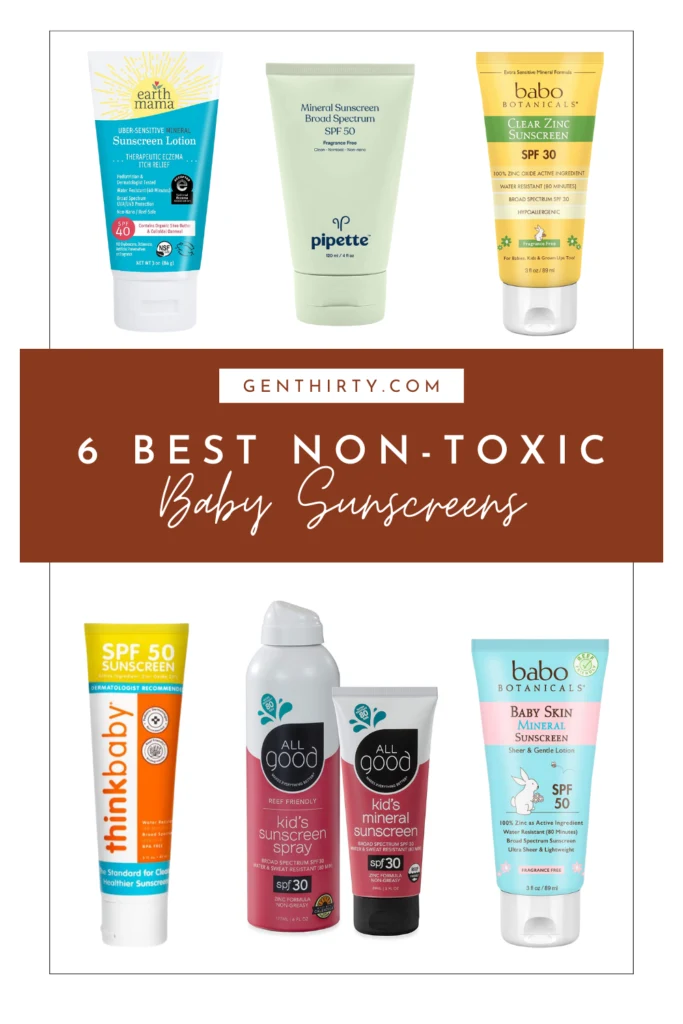
Final Thoughts on The Best Non Toxic Baby Sunscreen
It goes without saying that protecting your baby’s delicate skin from the sun is important. However, as we have seen, some sunscreens may contain harmful chemicals or irritants that can affect your little one’s health.
This is why it is so important to only go for a non-toxic baby sunscreen that is mineral-based, fragrance-free, water-resistant, and has a high SPF.
In this article, we have reviewed six of the best non-toxic baby sunscreens on the market in 2023. Each of these products comes with amazing reviews and is safe, effective, and easy to use.
This ought to give you the peace of mind that comes with knowing you are using nothing but the best products for your precious little bundle.
Hopefully, this article has helped you make an informed decision about which non-toxic baby sunscreen to buy for your little one.
And remember, always apply sunscreen generously and frequently whenever you go outside with your baby. Do this throughout the year, not just during peak hours of sun exposure. Good luck!

